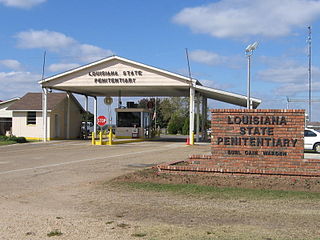Related Research Articles
A felony is traditionally considered a crime of high seriousness, whereas a misdemeanor is regarded as less serious. The term "felony" originated from English common law to describe an offense that resulted in the confiscation of a convicted person's land and goods, to which additional punishments including capital punishment could be added; other crimes were called misdemeanors. Following conviction of a felony in a court of law, a person may be described as a felon or a convicted felon.
Life imprisonment is any sentence of imprisonment for a crime under which convicted people are to remain in prison for the rest of their natural lives or indefinitely until pardoned, paroled, or otherwise commuted to a fixed term. Crimes for which, in some countries, a person could receive this sentence include murder, torture, terrorism, child abuse resulting in death, rape, espionage, treason, drug trafficking, drug possession, human trafficking, severe fraud and financial crimes, aggravated criminal damage, arson, kidnapping, burglary, and robbery, piracy, aircraft hijacking, and genocide, crimes against humanity, war crimes, severe cases of child pornography, or any three felonies in case of three-strikes law. Life imprisonment can also be imposed, in certain countries, for traffic offences causing death. Life imprisonment is not used in all countries; Portugal was the first country to abolish life imprisonment, in 1884.
Burglary, also called breaking and entering (B&E) and sometimes housebreaking, is the act of illegally entering a building or other areas without permission, typically with the intention of committing a criminal offence. Usually that offence is theft, larceny, robbery, or murder, but most jurisdictions include others within the ambit of burglary. To commit burglary is to burgle, a term back-formed from the word burglar, or to burglarize.

Capital punishment is a legal penalty in the U.S. state of Louisiana.
Capital punishment is a legal penalty in the U.S. state of Utah.
In the United States, habitual offender laws have been implemented since at least 1952, and are part of the United States Justice Department's Anti-Violence Strategy. These laws require a person who is convicted of an offense and who has one or two other previous serious convictions to serve a mandatory life sentence in prison, with or without parole depending on the jurisdiction. The purpose of the laws is to drastically increase the punishment of those who continue to commit offenses after being convicted of one or two serious crimes.
Gregg v. Georgia, Proffitt v. Florida, Jurek v. Texas, Woodson v. North Carolina, and Roberts v. Louisiana, 428 U.S. 153 (1976), is a landmark decision of the U.S. Supreme Court. It reaffirmed the Court's acceptance of the use of the death penalty in the United States, upholding, in particular, the death sentence imposed on Troy Leon Gregg. The case is referred to by a leading scholar as the July 2 Cases, and elsewhere referred to by the lead case Gregg. The court set forth the two main features that capital sentencing procedures must employ in order to comply with the Eighth Amendment ban on "cruel and unusual punishments". The decision essentially ended the de facto moratorium on the death penalty imposed by the Court in its 1972 decision in Furman v. Georgia 408 U.S. 238 (1972).
In the United States, the law for murder varies by jurisdiction. In many US jurisdictions there is a hierarchy of acts, known collectively as homicide, of which first-degree murder and felony murder are the most serious, followed by second-degree murder and, in a few states, third-degree murder, which in other states is divided into voluntary manslaughter, and involuntary manslaughter such as reckless homicide and negligent homicide, which are the least serious, and ending finally in justifiable homicide, which is not a crime. However, because there are at least 52 relevant jurisdictions, each with its own criminal code, this is a considerable simplification.
Murder in Alaska constitutes the intentional killing, under circumstances defined by law, of people within or under the jurisdiction of the U.S. state of Alaska.
Murder in Pennsylvania constitutes the intentional killing, under circumstances defined by law, of people within or under the jurisdiction of the U.S. state of Pennsylvania.
Capital punishment is a legal penalty in the U.S. state of Georgia. Georgia reintroduced the death penalty in 1973 after Furman v. Georgia ruled all states' death penalty statutes unconstitutional. The first execution to take place afterwards occurred in 1983.
Murder in Alabama constitutes the intentional killing, under circumstances defined by law, of people within or under the jurisdiction of the U.S. state of Alabama.
Murder in Arizona constitutes the intentional killing, under circumstances defined by law, of people within or under the jurisdiction of the U.S. state of Arizona.
Murder in Florida constitutes the intentional killing, under circumstances defined by law, of people within or under the jurisdiction of the U.S. state of Florida.
Murder in Kansas constitutes the intentional killing, under circumstances defined by law, of people within or under the jurisdiction of the U.S. state of Kansas.
Murder in South Carolina constitutes the intentional killing, under circumstances defined by law, of people within or under the jurisdiction of the U.S. state of South Carolina.
Murder in Texas constitutes the intentional killing, under circumstances defined by law, of people within or under the jurisdiction of the U.S. state of Texas.
Murder in Wisconsin constitutes the intentional killing, under circumstances defined by law, of people within or under the jurisdiction of the U.S. state of Wisconsin.

The law on the crime of murder in the U.S. state of California is defined by sections 187 through 191 of the California Penal Code.
References
- ↑ "National Center for Health Statistics: Homicide Mortality by State". Centers for Disease Control and Prevention. February 16, 2021. Retrieved September 24, 2021.
- ↑ Arkansas Code Ann. Sec. 5-10-101(a)(1) and (2)
- ↑ Arkansas Code Ann. Sec. 5-10-102(a)(1)
- ↑ Arkansas Code Ann. Sec. 5-4-401(a)(1)